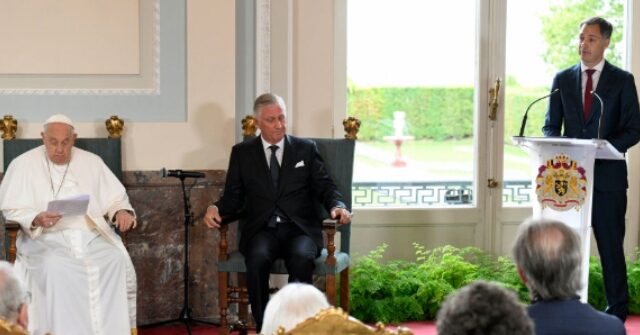In a recent confrontation between Belgian Prime Minister Alexander De Croo and Pope Francis, the pontiff’s remarks on abortion sparked significant outrage. During an informal press conference while returning to Rome from Belgium, Pope Francis labeled abortion as “murder” and referred to doctors who perform the procedure as “contract killers.” His comments drew immediate criticism from De Croo, who deemed it inappropriate for a foreign head of state to comment on Belgium’s democratic processes. The prime minister emphasized that the country does not require instruction on how its lawmakers operate, reflecting a broader sentiment that the church’s influence in civil matters is no longer welcomed in modern Belgium.
The pope’s statements, which aimed to reaffirm the church’s pro-life stance, emphasized that women hold the right to life, both for themselves and for their unborn children. He firmly declared, “Abortion is a homicide. … There is no debate about that.” These remarks have not only polarized opinions but also highlighted ongoing societal divides within Belgium, as the nation continues to debate a proposed law that would extend the legal time frame for abortions from 12 to 18 weeks. De Croo’s strong reaction can thus be seen in this broader context of legal and ethical discussions surrounding women’s rights and reproductive health in the country.
Central to this contentious exchange is the historical backdrop of abortion legislation in Belgium, particularly the legacy of King Baudouin, who was famously deposed by the government for a day in 1990 as a protest against his refusal to sign a law that legalized abortion. The law was enacted in his absence, illustrating the tension between monarchy and parliamentary democracy at the time. During his visit to Belgium, Pope Francis memorialized King Baudouin, portraying him as a figure of moral conviction for advocating life. This reflection deepens the significance of the ongoing abortion debate in the context of Belgium’s political and cultural history.
The pope’s remarks about abortion are part of a larger narrative where Catholic leadership seeks to influence moral discussions around human rights and the sanctity of life. His statements regarding the number of abortions occurring annually in Belgium—estimated to be over 16,000—underlined a pressing concern that resonates with the church’s advocacy for protecting unborn lives. In stark contrast, the Belgian government’s push for more liberal abortion laws reflects evolving societal values surrounding reproductive rights, indicating a schism between the Vatican’s moral framework and contemporary secular governance.
Furthermore, De Croo’s reaction to the pope reflects a defensive stance that acknowledges the complexities of democratic decision-making, especially regarding laws that impact women’s autonomy. His refusal to accept the pope’s moral teachings in the political arena underscores a broader trend where secular governance and religious influences are increasingly viewed as incompatible. The strong sentiments expressed by both leaders highlight the ongoing conflict between religious beliefs and state legislation, particularly on deeply personal issues such as abortion.
In conclusion, the exchange between Pope Francis and Prime Minister Alexander De Croo represents a significant flashpoint in the ongoing debate over abortion rights in Belgium. As the country grapples with updating its laws and accommodating the rights of women, the pope’s statements serve as a reminder of the church’s continuing influence in moral discussions, despite Belgium’s modern democratic framework that champions individual rights. This incident illustrates the challenges inherent in reconciling differing viewpoints on life, autonomy, and governance in a pluralistic society.

